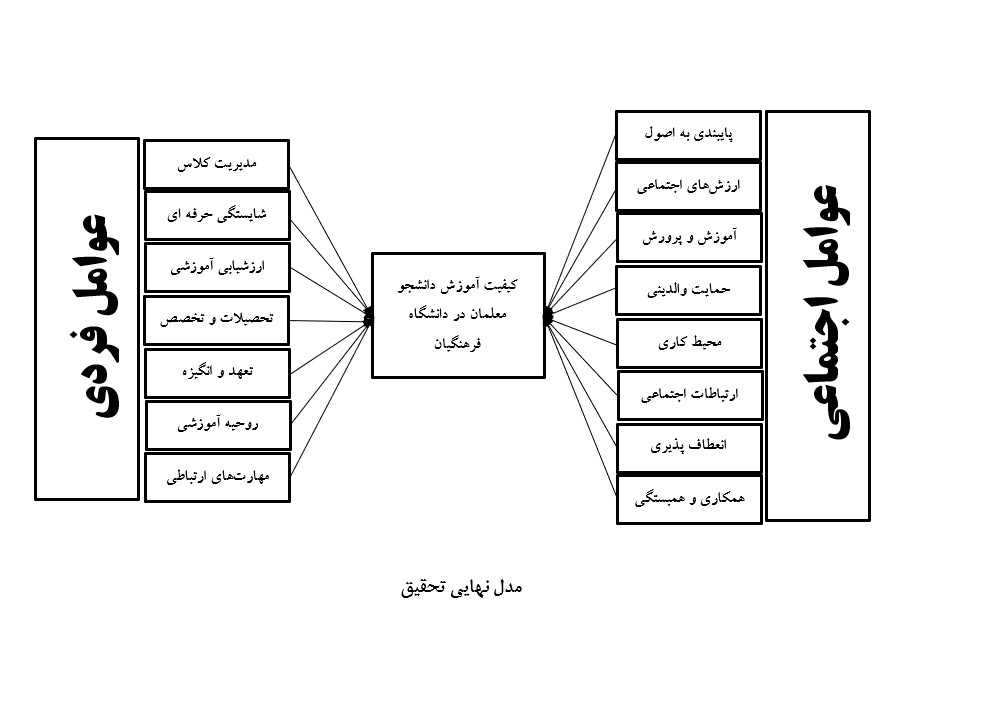مدل مفهومی عوامل مؤثر بر کیفیت آموزش دانشجو-معلمان دانشگاه فرهنگیان یک مطالعه کیفی با استفاده از تکنیک دلفی فازی
کلمات کلیدی:
مدل, کیفیت آموزش, عوامل فردی و اجتماعی, دلفی فازی, دانشگاه فرهنگیانچکیده
پژوهش حاضر با هدف طراحی مدل عوامل مؤثر بر کیفیت آموزش دانشجو-معلمان دانشگاه فرهنگیان با استفاده از تکنیک دلفی فازی انجام شد. این پژوهش به لحاظ هدف کاربردی و از نظر ماهیت پیمایشی است. جامعه آماری شامل خبرگان حوزه اموزش بودند که با توجه به معیارهایی مانند تخصص و تجربه در زمینه مربوطه شناسایی شدند و 18 نفر از انان در پزوهش حاضر شرکت داشتند. پس ازبررسی متون و انجام مصاحبههای نیمه ساختارمند و کدگذاریهای مربوطه، مدل اولیه طراحی شد سپس جهت غربال گری شاخصها از تکنیک دلفی فازی استفاده شد. در تکنیک دلفی فازی، مقادیر بالای 7/0 توسط خبرگان تایید شدند.مدل طراحی شده مشتمل بر 15 مولفه عوامل فردی و اجتماعی میباشد. 7 مولفه در بعد عوامل فردی (مدیریت کلاس، شایستگی حرفه ای، ارزشیابی آموزشی، تحصیلات و تخصص، تعهد و انگیزه، روحیه آموزشی و مهارتهای ارتباطی) و 8 مولفه در بعد عوامل اجتماعی (پایبندی به اصول، ارزشهای اجتماعی، آموزش و پرورش، حمایت والدینی، محیط کاری، ارتباطات اجتماعی، انعطاف پذیری سازمانی و همکاری و همبستگی). این پژوهش نشان داد که کیفیت آموزش دانشجو-معلمان دانشگاه فرهنگیان تحت تاثیر عوامل مختلفی قرار دارد که با توجه به یافتههای این مطالعه، مد نظر قرار دادن دو بعد فردی و اجتماعی میتواند زمینه را برای ارتقاء کیفیت آموزش ارائه شده به دانشجو-معلمان را فراهم اورد.
دانلودها
مراجع
Ball SJ. The education debate: Policy Press; 2021.
Ali Ghorbani M, Zolfaghari R, Imani MN. Identifying Dimensions and Components of Innovative Teaching Methods in Higher Education. Sociology of Education. 2024;10(1):355-65. doi: 10.22034/ijes.2024.559157.1340.
Golabchi H, Kiaee M, Kameli MJ. Designing a Superior Service Delivery Model in Education to Enhance Public Satisfaction. Iranian Journal of Educational Sociology. 2024;7(1):189-97. doi: 10.61838/kman.ijes.7.1.18.
Mohammadi Komroudi MJ, Ahmadi M, Farhadi Mahalli A. Designing an Ethically-Oriented Management Model for Employee Education Development in Higher Education Using Grounded Theory (Case Study: Free Universities of Mazandaran Province). Iranian Journal of Educational Sociology. 2024;7(2):114-23. doi: 10.61838/kman.ijes.7.2.14.
Bezi A, Fakoori H, Bayani AA, Saemi H. Design and Validation of an Environmental Education Curriculum Model for Higher Education Based on the "Aker" Approach. Iranian Journal of Educational Sociology. 2024;7(1):79-90. doi: 10.61838/kman.ijes.7.1.8.
Delghandi M, karimi M, Nodehi H, Cherabin M. Designing an Efficient Virtual Education Pattern in Farhangian University. Sociology of Education. 2024;10(1):280-94. doi: 10.22034/ijes.2024.2012176.1469.
Jafarzadeh Ghadimi R, Enayati T, Salehi M. Identifying Dimensions of an Innovative University to Provide a Model (Case Study: Islamic Azad University). Iranian Journal of Sociology of Education. 2018;1(8):115-35.
Darling-Hammond L. Defining teaching quality around the world. European Journal of Teacher Education. 2021;44(3):295-308.
Hsieh TL. Motivation matters? The relationship among different types of learning motivation, engagement behaviors and learning outcomes of undergraduate students in Taiwan. Higher Education. 2014;68:417-33.
Prasad S, Tata J. The role of socio‐cultural, political‐legal, economic, and educational dimensions in quality management. International Journal of Operations & Production Management. 2003;23(5):487-521.
Ren X, Tong Y, Peng P, Wang T. Critical thinking predicts academic performance beyond general cognitive ability: Evidence from adults and children. Intelligence. 2020;82:101487.
Uyulgan MA, Akkuzu N. An Overview of Student Teachers' Academic Intrinsic Motivation. Educational Sciences: Theory and Practice. 2014;14(1):24-32.
Erdem E, Demirel Ö. Teacher self-efficacy belief. Social Behavior and Personality: An International Journal. 2014;35(5):573-86.
Furlong J, Maynard T. Mentoring student teachers: The growth of professional knowledge: Routledge; 2012.
Altınay Z. Evaluating peer learning and assessment in online collaborative learning environments. Behaviour & Information Technology. 2017;36(3):312-20.
Irvine JJ. Educating teachers for diversity: Seeing with a cultural eye: Teachers College Press; 2003.
Salehi Zadeh M, Ghorchian N, Mohammad Davoodi AH, Gholavandi H. Presenting a model for enhancing the quality of professional teaching among faculty members of Farhangian University. Research in Teaching Quarterly. 2019;7(2).
Agrati LS. Tutoring in the Metaverse. Study on Student-Teachers’ and Tutors’ Perceptions About NPC Tutor. Frontiers in Education. 2023;8. doi: 10.3389/feduc.2023.1202442.
Ebrahimi A, Zeinabadi H, Hadavandi MR. A Qualitative Study of Factors Influencing the Desire for Retention of Student-Teachers at Farhangian University in the Ministry of Education: Case Study of Tehran Province. Semi-Annual Scientific Research Journal of Educational and Academic Studies. 2018;6(17):Autumn and Winter 2018.
Frei-Landau R, Grobgeld E, Guberman R. Implementing Digital Neuroscience in Special-Needs-Teacher Education: Exploring Student-Teachers’ Multifaceted Learning Outcomes Related to Teaching Children With Neurodevelopmental Disorders. Frontiers in Psychology. 2023;14. doi: 10.3389/fpsyg.2023.1232315.
Karimi A, Gholtash A, Machinchi AA. Develop and validate a model for teaching metacognitive skills based on quantum thinking to student-teachers. Sociology of Education. 2023;9(1):359-70. doi: 10.22034/ijes.2022.544223.1207.
Knobe M, Holschen M, Mooij SC, Sellei RM, Münker R, Antony P, et al. Knowledge Transfer of Spinal Manipulation Skills by Student-Teachers: A Randomised Controlled Trial. European Spine Journal. 2012;21(5):992-8. doi: 10.1007/s00586-011-2140-8.
Mannathoko MC. Does Teaching Practice Effectively Prepare Student-Teachers to Teach Creative and Performing Arts? The Case of Botswana. International Journal of Higher Education. 2013;2(2). doi: 10.5430/ijhe.v2n2p115.
Obispo RT, Magulod GC, Tindowen DJ. Teachers’ Classroom Management Styles and Student-Teacher Connectedness and Anxiety. International Journal of Learning Teaching and Educational Research. 2021;20(5):123-41. doi: 10.26803/ijlter.20.5.7.
Rafiei M, Sharifi M. The status of Quranic literacy among students (Case Study: Student-teachers at Farhangian University). Biannual Journal of Quran Recitation Studies. 2023;11(21).
Abedini M, Mansouri S, Kamali Ardakani HR. Identifying and ranking factors affecting effective teaching in medical sciences universities based on structural interpretive modeling. Journal of Jundishapur Education Development. 2020;11(3).

دانلود
چاپ شده
ارسال
بازنگری
پذیرش
شماره
نوع مقاله
مجوز
حق نشر 2025 Zahra Yarahmadi (Author); Mehri Daraei (Corresponding author); Hossein Mehrdad (Author)

این پروژه تحت مجوز بین المللی Creative Commons Attribution-NonCommercial 4.0 می باشد.










